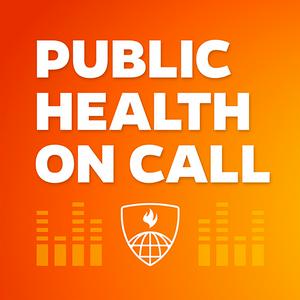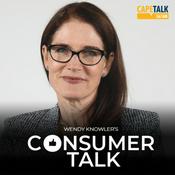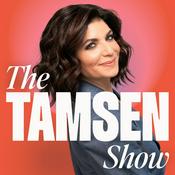Public Health On Call

1089 episodes

993 - What to Know About Whooping Cough
2026/1/07 | 15 mins.
About this episode: Pertussis—more commonly known as "whooping cough—is on the rise, with more than 25,000 cases and a number of child deaths recorded in the U.S. in 2025. In this episode: Dr. Erica Prochaska talks about the symptoms of pertussis, how it spreads, when to seek out medical care, how to prevent infection, and the role of vaccines. Guests: Dr. Erica Prochaska, MHS, is a pediatric infectious disease doctor at the Johns Hopkins Children's Center and an assistant professor of Pediatrics at the Johns Hopkins School of Medicine. Host: Lindsay Smith Rogers, MA, is the producer of the Public Health On Call podcast, an editor for Expert Insights, and the director of content strategy for the Johns Hopkins Bloomberg School of Public Health. Show links and related content: Epidemiological Update: Pertussis (Whooping Cough) in the Americas Region—Pan American Health Organization Global whooping cough resurgence after COVID lull may point to need for better vaccines—CIDRAP More than 25,000 whooping cough cases reported this year as Kentucky records 3rd infant death—ABC News An Update On Measles, Pertussis, Mpox, and Other Vaccine-Preventable Diseases—Public Health On Call (November 2024) Transcript information: Looking for episode transcripts? Open our podcast on the Apple Podcasts app (desktop or mobile) or the Spotify mobile app to access an auto-generated transcript of any episode. Closed captioning is also available for every episode on our YouTube channel. Contact us: Have a question about something you heard? Looking for a transcript? Want to suggest a topic or guest? Contact us via email or visit our website. Follow us: @PublicHealthPod on Bluesky @PublicHealthPod on Instagram @JohnsHopkinsSPH on Facebook @PublicHealthOnCall on YouTube Here's our RSS feed Note: These podcasts are a conversation between the participants, and do not represent the position of Johns Hopkins University.

992 - HHS Changes Its Pediatric Vaccine Recommendations—Part 2, Vaccine-Preventable Diseases
2026/1/06 | 23 mins.
About this episode: Citing a memorandum from President Trump, health officials in the Trump Administration are ending routine recommendations for vaccinating against meningitis, hepatitis A and B, and rotavirus. Vaccine expert Ruth Karron explains why each of these vaccines is critical for safeguarding health, reducing hospitalizations, and preventing deaths. She and Dr. Josh Sharfstein recorded this episode before the recent vaccine announcement. They also discuss chickenpox and RSV, where recommendations remain in place. *Please note that this episode was recorded prior to the announcement from HHS changing recommended vaccines for children. Note: These podcasts are a conversation between the participants, and do not represent the position of Johns Hopkins University. Guests: Dr. Ruth Karron is a pediatrician and a professor of Internation Health at the Johns Hopkins Bloomberg School of Public Health. She is the director of Johns Hopkins Vaccine Initiative. Host: Dr. Josh Sharfstein is distinguished professor of the practice in Health Policy and Management, a pediatrician, and former secretary of Maryland's Health Department. Show links and related content: HHS Changes Its Pediatric Vaccine Recommendations: What's Different, What Remains, and What It Means for American Health—Johns Hopkins Bloomberg School of Public Health CDC Acts on Presidential Memorandum to Update Childhood Immunization Schedule—U.S. Department of Health and Human Services Hepatitis B Vaccination is an Essential Safety Net for Newborns—Johns Hopkins Bloomberg School of Public Health Two New RSV Products to Protect Infants—Public Health On Call (November 2023) Vaccines 101—Public Health On Call (2025) Transcript information: Looking for episode transcripts? Open our podcast on the Apple Podcasts app (desktop or mobile) or the Spotify mobile app to access an auto-generated transcript of any episode. Closed captioning is also available for every episode on our YouTube channel. Contact us: Have a question about something you heard? Looking for a transcript? Want to suggest a topic or guest? Contact us via email or visit our website. Follow us: @PublicHealthPod on Bluesky @PublicHealthPod on Instagram @JohnsHopkinsSPH on Facebook @PublicHealthOnCall on YouTube Here's our RSS feed

991 - HHS Changes Its Pediatric Vaccine Recommendations—Part 1, The Announcement
2026/1/06 | 16 mins.
About this episode: HHS leadership started 2026 with an unexpected announcement changing federal childhood vaccine recommendations. In this episode: Dr. Josh Sharfstein joins Lindsay Smith Rogers to talk about the announcement's immediate impact, the rationale behind it, and how it will reshape vaccination in the U.S. Note: These podcasts are a conversation between the participants, and do not represent the position of Johns Hopkins University. Guests: Dr. Josh Sharfstein is distinguished professor of the practice in Health Policy and Management, a pediatrician, and former secretary of Maryland's Health Department. Host: Lindsay Smith Rogers, MA, is the producer of the Public Health On Call podcast, an editor for Expert Insights, and the director of content strategy for the Johns Hopkins Bloomberg School of Public Health. Show links and related content: HHS Changes Its Pediatric Vaccine Recommendations: What's Different, What Remains, and What It Means for American Health—Johns Hopkins Bloomberg School of Public Health CDC Acts on Presidential Memorandum to Update Childhood Immunization Schedule—U.S. Department of Health and Human Services Kennedy Scales Back the Number of Vaccines Recommended for Children—New York Times AAP Opposes Federal Health Officials' Unprecedented Move to Remove Universal Childhood Immunization Recommendations—American Academy of Pediatrics Vaccines 101: The Vaccine Injury Compensation Program—Public Health On Call (February 2025) Transcript information: Looking for episode transcripts? Open our podcast on the Apple Podcasts app (desktop or mobile) or the Spotify mobile app to access an auto-generated transcript of any episode. Closed captioning is also available for every episode on our YouTube channel. Contact us: Have a question about something you heard? Looking for a transcript? Want to suggest a topic or guest? Contact us via email or visit our website. Follow us: @PublicHealthPod on Bluesky @PublicHealthPod on Instagram @JohnsHopkinsSPH on Facebook @PublicHealthOnCall on YouTube Here's our RSS feed

990 - Is There a Fertility Crisis?
2026/1/05 | 14 mins.
About this episode: The U.S. marked its lowest birth rate on record in 2024 with American women having—on average—1.6 children. Does this mean that the country has a fertility crisis? In this episode: Associate professor of Population, Family and Reproductive Health Linnea Zimmerman discusses how to measure fertility, assess trends in birth rates in the U.S. and worldwide, and think about the interaction between individual decisions and social needs. Guests: Linnea Zimmerman, PhD, MPH, is an associate professor of Population, Family and Reproductive Health at the Johns Hopkins Bloomberg School of Public Health. Host: Dr. Josh Sharfstein is distinguished professor of the practice in Health Policy and Management, a pediatrician, and former secretary of Maryland's Health Department. Show links and related content: Births: Provisional Data for 2024—Vital Statistics Rapid Release U.S. birth rate hits all-time low, CDC data shows—CBS News Transcript information: Looking for episode transcripts? Open our podcast on the Apple Podcasts app (desktop or mobile) or the Spotify mobile app to access an auto-generated transcript of any episode. Closed captioning is also available for every episode on our YouTube channel. Contact us: Have a question about something you heard? Looking for a transcript? Want to suggest a topic or guest? Contact us via email or visit our website. Follow us: @PublicHealthPod on Bluesky @PublicHealthPod on Instagram @JohnsHopkinsSPH on Facebook @PublicHealthOnCall on YouTube Here's our RSS feed Note: These podcasts are a conversation between the participants, and do not represent the position of Johns Hopkins University.

989 - A Sharp Rise in Pickleball Injuries
2025/12/18 | 12 mins.
About this episode: The only thing increasing faster than the number of new pickleball players is the number of pickleball injuries. Between 2017 and 2022, sports medicine experts saw a seven-fold increase in injuries. In this episode: orthopedic surgeon Eric Bowman tells Stephanie Desmon—Public Health On Call's resident pickleball devotee—what's driving these injuries, who's most at risk, and how players can stay healthy. Guests: Dr. Eric Bowman, MPH, is an orthopaedic surgeon in the practice of sports medicine at the Vanderbilt University Medical Center. Host: Stephanie Desmon, MA, is a former journalist, author, and the director of public relations and communications for the Johns Hopkins Center for Communication Programs. Show links and related content: As Pickleball Continues to Gain Players, Injuries Are Increasing—JAMA Evaluation of Pickleball-Related Injuries at a Single Institution From 2017 to 2022—Orthopaedic Journal of Sports Medicine Pickleball-Related Ocular Injuries Among Patients Presenting to Emergency Departments—JAMA Ophthalmology Pickleball-related injuries are on the rise, doctors say—NBC News Transcript information: Looking for episode transcripts? Open our podcast on the Apple Podcasts app (desktop or mobile) or the Spotify mobile app to access an auto-generated transcript of any episode. Closed captioning is also available for every episode on our YouTube channel. Contact us: Have a question about something you heard? Looking for a transcript? Want to suggest a topic or guest? Contact us via email or visit our website. Follow us: @PublicHealthPod on Bluesky @PublicHealthPod on Instagram @JohnsHopkinsSPH on Facebook @PublicHealthOnCall on YouTube Here's our RSS feed Note: These podcasts are a conversation between the participants, and do not represent the position of Johns Hopkins University.
More Education podcasts
Trending Education podcasts
About Public Health On Call
Listen to Public Health On Call, Pepp Talk Podcast and many other podcasts from around the world with the radio.net app

Get the free radio.net app
- Stations and podcasts to bookmark
- Stream via Wi-Fi or Bluetooth
- Supports Carplay & Android Auto
- Many other app features
Get the free radio.net app
- Stations and podcasts to bookmark
- Stream via Wi-Fi or Bluetooth
- Supports Carplay & Android Auto
- Many other app features


Public Health On Call
download the app,
start listening.



































